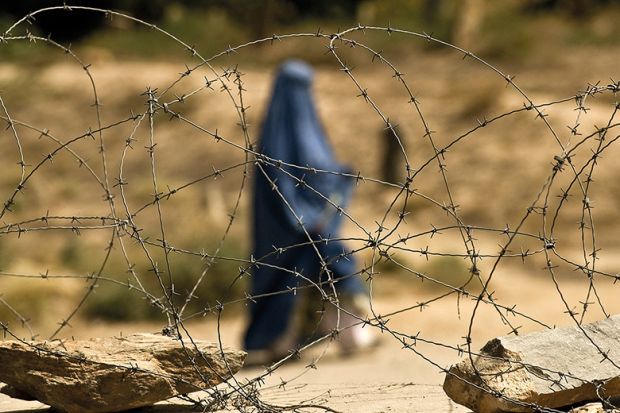After two years of Taliban rule, there is still no indication of whether universities’ doors will ever be reopened to Afghan women.
Despite promises of a more inclusive and moderate approach this time around, the Taliban’s history of suppressing women’s rights during its previous period of rule from 1996 to 2001 meant that few were surprised when demands to segregate male and female university students were quickly followed by the reimposition of a complete ban on women studying at Afghan universities and secondary schools.
Restrictions on women’s mobility and employment further limits their prospects. The Taliban’s conservative interpretation of Islamic law discourages women from pursuing careers outside traditional roles, hindering their professional growth and economic independence.
Prior to the Taliban’s return in 2021, the presence of female educators and role models within academic institutions was playing a crucial role in inspiring and empowering female students. However, Afghanistan’s female academics, too, have been told to remain in their homes and not come to campus.
The Taliban’s influence has also led to the appointment of conservative administrators and faculty members, who enforce stricter regulations and curtail academic freedom. This has resulted in a narrowing of perspectives, limited critical thinking and a suppression of diverse voices within the academic environment.
Such repressive policies, combined with the country’s uncertain future under Taliban rule, is having severe psychological consequences for housebound former university students and teachers. The constant fear and anxiety, as well as the feeling of being trapped, has led to increased stress levels and mental health issues.
The lack of support systems and limited access to mental health resources further exacerbate the problem. A young woman who used to study in the journalism faculty of an Afghan public university told me: “My classmates have graduated from university, but I have not. It is a very disappointing moment for me, and sometimes I feel deeply depressed when I see my hopes lost forever. It even makes me contemplate suicide.”
A junior student at Kabul University confided to me her distress at having to abandon her aspirations of becoming an influential figure in Afghan society. Her family is convinced that opportunities for women to pursue higher education will remain closed under the Taliban regime, so they are pressuring her to enter into an early marriage, further increasing her sense of isolation.
The Taliban’s stance on women’s rights, particularly their right to education, has been questioned by Islamic scholars worldwide. One such scholar, Abdul-Rab-Rasool Sayaf, who graduated from the renowned Al-Azhar University, a leading centre of Islamic studies in Cairo, has openly criticised the Taliban’s radical approach to girls’ education at university level. He challenged the Taliban to provide any Islamic references from the Holy Koran and Hadiths that justify the ban on women’s education. In a video shared on social media, he emphatically stated that the Taliban’s prohibition on women’s education is not in line with Islamic principles.
Nevertheless, the Taliban is unlikely to be swayed by such interventions from abroad. Nor is there any realistic prospect of women fighting back against their complete exclusion from education. Any protest or dissent, including on social media, is met by threats from the Taliban, including visits to their homes from Taliban officials to warn their male family members to prevent any repeat of the women’s behaviour.
Nevertheless, collaborative efforts from the international community, civil society and individuals could offer hope to Afghan women seeking an education. For instance, Sheikh Khalaf Ahmad Al Habtoor, an Arab businessman, has recently paid for 100 female Afghan university students to study in Dubai. The students were initially stopped by the Taliban at Kabul Airport, but they managed to arrange their journey with additional financial assistance from the businessman. This initiative could serve as a model that international funding organisations and other philanthropists could imitate.
By prioritising Afghan women’s education, amplifying their voices and advocating for their rights, we can collectively strive towards a more inclusive and equitable future. This future would empower Afghan women to actively participate in society once again, contributing to their nation’s progress and, no less important, rekindling their hopes of realising their own personal aspirations.
The author is based in Afghanistan. For safety reasons, he has asked to remain anonymous.




